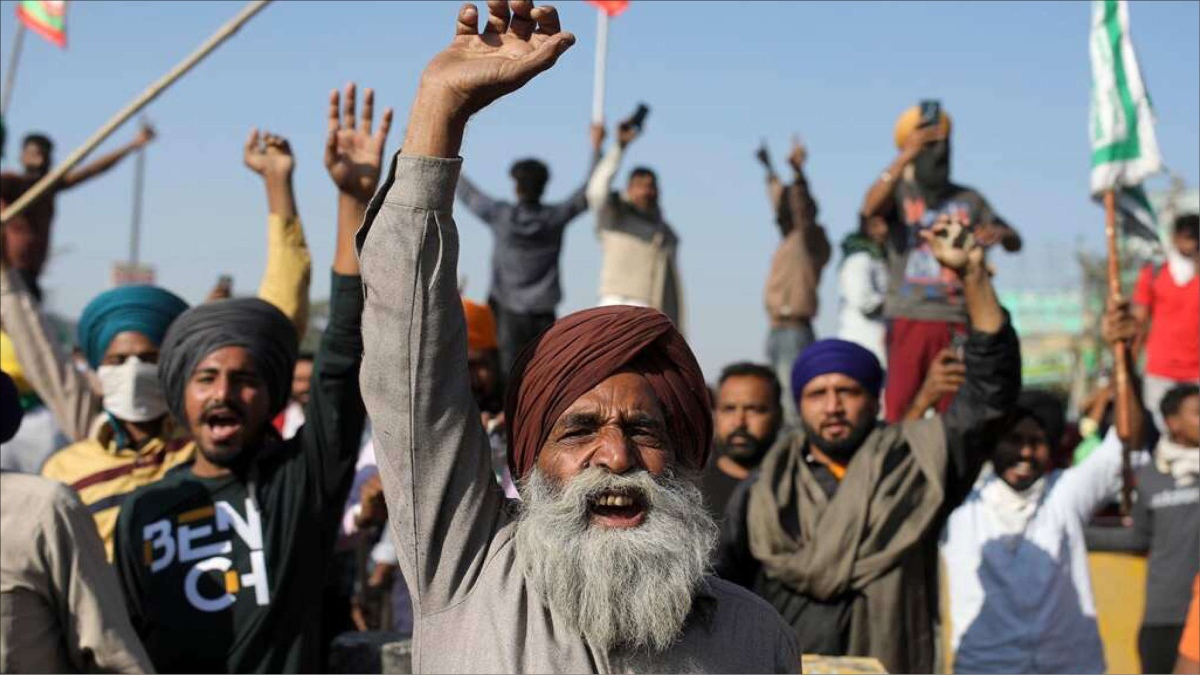While it is never prudent to open a new front in testing times, the government has become a critical player with respect to the ongoing farmer protests in northern India and elsewhere, even as difficult challenges in the diplomatic and fiscal fields are very much there. The aftermath of the novel coronavirus pandemic has to be tackled over a period of time too.
Sensitive districts, such as Meerut and Muzaffarnagar, that are home to magnificent former and present soldiers, are in the throes of big demonstrations; kisan mahapanchayats have been organised at several places.
The political and administrative response to the agitation is broadly akin to that of past protests and has evoked memories of the Emergency of the mid-1970s. What, however, distinguishes the present moment from earlier ones is the inability to vilify the unrest in the name of nation or religion.
An incumbent chief minister warned of events like Operation Blue Star (1984), a veteran politician (Sharad Pawar, Nationalist Congress Party) said that he had not heard of nails being embedded in roads even under the British, and pointed to the dangers of the agitation turning violent and becoming a global issue. The RSS top brass are best placed to assess the implications in terms of electoral outcomes and the impact on India’s image abroad.
The terrible tragedy of Jallianwala Bagh (13 April 1919), whose seeds were sown by the Rowlatt Acts (named after Sir Sidney Rowlatt, English lawyer and judge, who chaired a Sedition Committee to evaluate the links between political terrorism in India), is not being referred to, for now. Nor are the anti-Sikh riots that followed Mrs Indira Gandhi’s death.
The Rowlatt Acts, which had extended the repressive measures of World War I, had been met by sweeping anger and discontent among Indians, notably in the then undivided Punjab. That Baisakhi day, the firing at Jallianwala Bagh in Amritsar had killed several hundred people and wounded many hundreds more. The Acts were never actually implemented and were repealed in 1922.
In present times, a steady erosion of the ‘neighbourhood’ policy, the setback inflicted by Colombo in cancelling a 2019 Agreement with India and Japan for operating the East Coast Terminal (ECT), and the picture of economic distress and unemployment might pale in importance, as foreign governments and agencies wade into the questions raised by the farmers’ bodies.
A Khalistan supporter in Vancouver (Canada) ranted, “If the farm acts get repealed tomorrow, that is not a victory. This battle begins with the repeal of the farm laws. It does not end there. Anybody who tells you that this is going to end with the repeal of the farm laws is trying to drain energy from the movement.”
Meena Harris, lawyer and activist and niece of the US Vice President, tweeted that she was more than willing to take the Indian government on, saying “If this is what it means to be pro-democracy and pro-human rights, then let’s go.”
These are anxious times for the foreign affairs establishment in the South Block which will need to react with deeper maturity and count their allies (in addition to France, a permanent member) in the UN Security Council. Character assassination campaigns will have to be avoided.
At this juncture, the stance of the new US administration is crucial for India. The initial observations to arrive through the White House Press Secretary were “cautiously optimistic” when she said that “President Biden respects and values the successful bipartisan relationship with India”. At a later date, the American Embassy in New Delhi reiterated remarks by the State Department, that the US recognises unhindered access to information, including the internet, as fundamental to the freedom of expression and “a hallmark of a thriving democracy”.
Significantly, the India-China impasse in Ladakh seems to have begun to ease in the early weeks of the new presidency.
Officials in New Delhi assert, on condition of anonymity, that the government is sticking to its guns on the high value deal with Russia for S-400 air defence systems, despite reports of possible US sanctions—an issue with the potential of becoming an irritant in ties with the Biden-Harris dispensation.
Be that as it may, where do we go from here?
The protests are on the streets, the protestors are bypassing Delhi and the resentment could spread. The least that needs to be done is to ensure that the movement does not emerge as a separatist platform and that Sikhs, Jats, Yadavs, indeed the entire rural population, do not feel cornered. The consequences, otherwise, could be overwhelming.
Some 120 million Indians lost jobs last year. Their lives and the futures of their children could have been destroyed. Most people who became unemployed found ways to survive without the government’s intervention.
Political parties in India have often won elections through the manipulation of identities of minorities, caste and region. For the first time since Independence, farmers are demolishing the sub-identities. Sooner rather than later, the super-billionaires, the ultra-rich and the upper echelons as a whole, may find that the battle is coming to an end and that they count for less and less in the politics and governance of India.
Growing disenchantment with the conventional political class is providing a chance to an alternative leadership from the rural areas and from different sections of society, from villages and towns, from professionals, scientists, engineers and doctors, to fill the space being vacated by power centres. At the apex, the country needs younger men and women of calibre, integrity and dedication. For them, heroes of the freedom struggle like Rajendra Prasad, Vallabhbhai Patel and Jayaprakash Narayan—who had a close connection with the country’s poorest, the landless and ordinary workers—should be role models.
The future can be theirs to seize.
The writer was formerly in the IAS. The views expressed are personal.
At this juncture, the stance of the new US administration is crucial for India. The initial observations to arrive through the White House Press Secretary were “cautiously optimistic” when she said that “President Biden respects and values the successful bipartisan relationship with India”. At a later date, the American Embassy in New Delhi reiterated remarks by the State Department, that the US recognises unhindered access to information, including the Internet, as fundamental to the freedom of expression and “a hallmark of a thriving democracy”.







